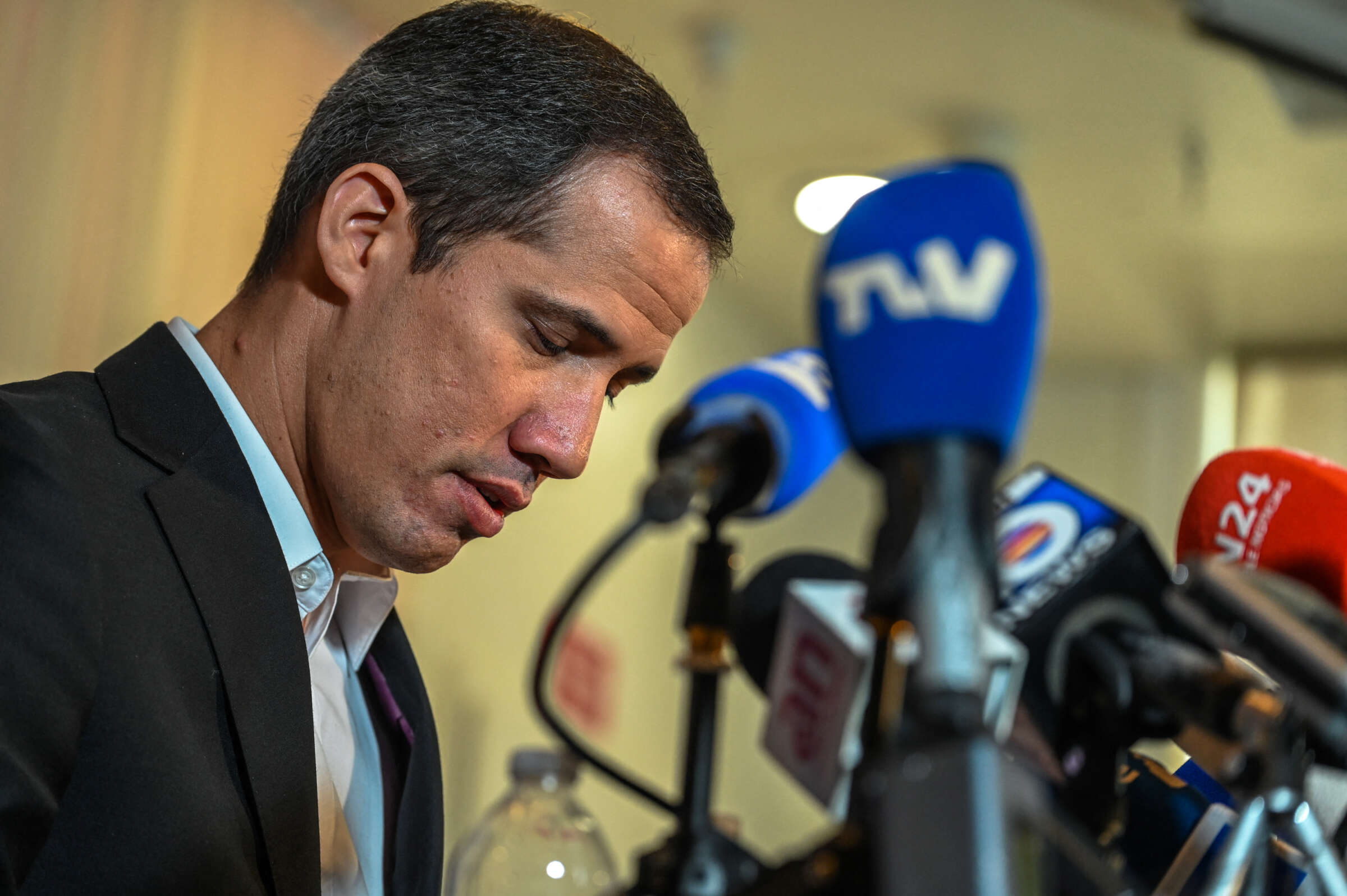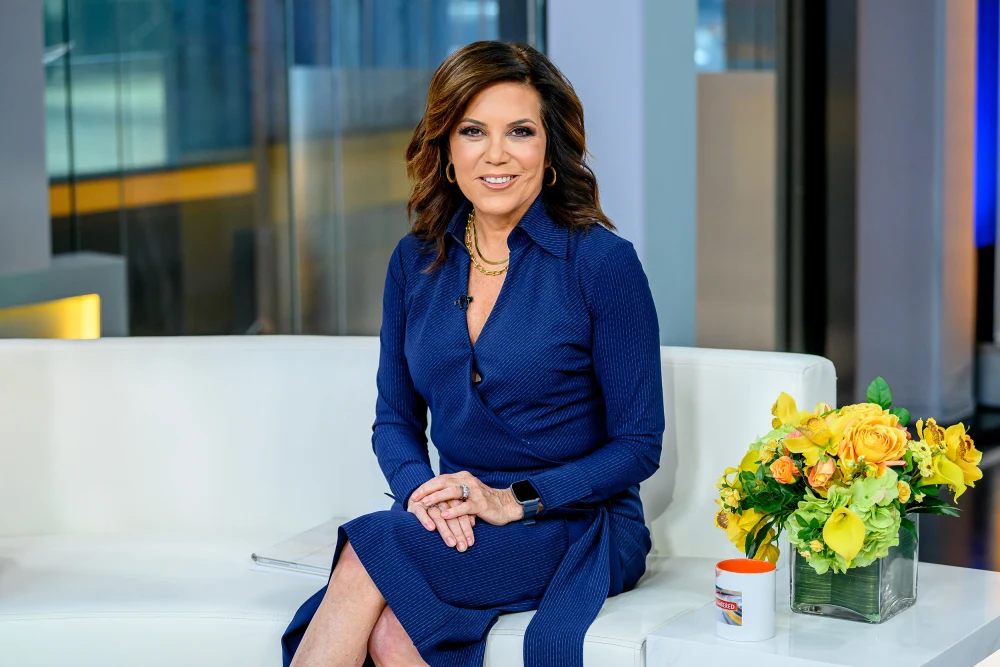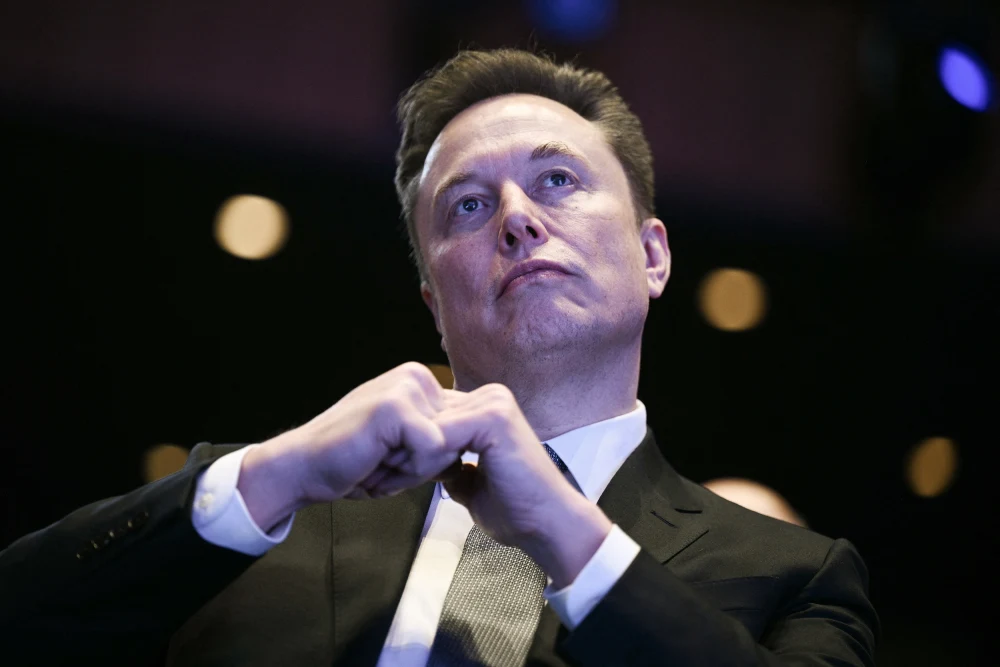Opposition leader Juan Guaidó’s fall from grace symbolizes the failure of U.S. and opposition tactics.
This spring, the Venezuelan opposition leader Juan Guaidó delivered a solemn address to the international press in Miami, Florida. Claiming his life was in danger, Guaidó announced that he fled Venezuela to escape persecution and rally the world against the government of President Nicolás Maduro.
In bold strokes, he argued that Maduro constitutes a threat to “the entire world,” declaring that Russian officials recently “gave [the president] instructions” to subvert hemispheric security. “We cannot allow Russia to also continue destabilizing the American continent,” he emphasized, while blaming the foreign superpower for the region’s immigration crisis.
Ridiculing his press conference, foreign political analysts and pundits portrayed Guaidó’s speech as a sad attempt to increase his visibility after opposition leaders dissolved his “interim government” in December.
Yet his emphasis on foreign interventionism was ironically appropriate. This May, the Center for Economic and Policy Research published a seminal study concluding that Western sanctions are heavily responsible for Venezuela’s humanitarian crisis. The report partly attributes rising mortality rates, medicine shortages, and a 78 percent decrease in food imports between 2012 and 2020 to United States policy.
In many ways, Guaidó’s flight to Miami signifies the failure of U.S. strategy in Venezuela. For more than two decades, Washington has intervened in Venezuelan society to sap support for the revolution that former President Hugo Chávez initiated. Yet instead, its policies have proven contradictory, pushing the opposition toward extremism, entrenching chavismo and accelerating an economic meltdown that now drives Venezuelans to the U.S. border.
Toxic Allies
Current tensions trace back to 1998, when Venezuelans elected Chávez, an outspoken critic of neoliberal policies that exacerbate inequality. Chávez oversaw the drafting of a new constitution that redistributed power to the poor and disenfranchised — even extending social security to housewives and formally granting them the status of workers. His progressive agenda and Afro-Indigenous heritage alarmed the elite and U.S. officials, who viscerally opposed his reforms and racistly referred to him as a “monkey.” Increasingly, the State Department regarded Chávez as an obstacle to the liberal consensus — the blend of open markets, formal democracy and U.S. hegemony — that policy makers envisioned for the region.
Seeking his ouster, the George W. Bush administration funneled $3.3 million to Venezuelan collaborators in six months, while making “numerous contacts” with the opposition. In April 2002, aid recipients kidnapped Chávez and installed Pedro Carmona, a prominent businessman. Previously, the U.S. embassy praised Carmona for his “critical role in advancing U.S. commercial interests,” calling him “the right man for the right time in Venezuela.”
Many opposition leaders who are running in the 2023 presidential primaries formerly participated in the coup. The conservative firebrand, María Corina Machado, signed the decree dissolving the government. Henrique Capriles even laid siege to the Cuban embassy, as assailants promised to starve the diplomats inside and force them to “eat carpet.” Eventually, their colleague, Henry Ramos Allup, dashed the myth that the coup was a spontaneous response to government excesses. “It’s a lie that the [Carmona] decree fell from the sky,” he explained, “we had all seen it a week before.”
Ultimately, the coup provoked a mass uprising that immobilized the country, compelling Carmona to flee, restoring Chávez and welding the stigma of treason to the opposition.
Over the next decade, chavistas introduced social legislation that slashed poverty rates in half and redistributed political power, retaining the devotion of the popular classes and further alienating the elite. Repeatedly, U.S. support emboldened government critics, while unintentionally tarnishing the opposition’s credibility. It also exacerbated a process of political polarization, especially after Chávez embraced socialism in 2005 — skewering the wealthy with his abrasive rhetoric. Many members of the elite agreed with leading Venezuelan commentator, José Antonio Gil, who saw only one solution: “He has to be killed.”
Nonetheless, the National Endowment for Democracy, the U.S. Agency for International Development, and other U.S. agencies continued channeling millions of dollars to government opponents. In 2009, the embassy listed its main objectives as “Penetrating Chavez’ Political Base,” “Dividing Chavismo” and “Isolating Chavez Internationally.” By then, U.S. authorities had granted assistance to more than 300 Venezuelan organizations to unite and strengthen dissent — sponsoring political education initiatives for more than 600,000 participants.
Yet policy makers found the strategy deeply frustrating, repeatedly describing opposition leaders as incompetent. That same year, the embassy fretted that their organizations “remain top-heavy and media-focused with little grassroots reach.” Diplomats also reported complaints that opposition party leaders in Un Nuevo Tiempo were “only interested in claiming power for themselves,” while those in Acción Democrática retained control because the “internal party rules are undemocratic.”
When the opposition revamped its coalition, the Democratic Unity Roundtable, in June 2009, U.S. policy makers noted a “typical display of poor coordination,” suspecting that leaders lacked “the will to sacrifice personal ambition for the sake of unity.” According to colleagues, the photogenic conservative Leopoldo López even arrived late at the press conference to draw attention to himself.
In 2013, Chávez’s death became a turning point, presenting opponents with a tantalizing opportunity to eject chavismo from power. After Capriles lost the presidential election to Maduro that year, he exhorted supporters to “unload their fury” in the streets, initiating a cycle of violent protests. Demonstrators hoped to escalate tensions, making the country ungovernable and compelling Maduro to resign. Machado confided that the head of the opposition coalition “told the State Department that the only way to resolve this [impasse] is by provoking and accentuating a crisis, a coup or a self-coup.”
As falling oil prices throttled Venezuela’s economy, López — who colleagues called “arrogant, vindictive, and power-hungry” — led “The Exit,” another wave of protests in 2014 demanding regime change. Participants strung wires to decapitate motorists and shot civilians crossing barricades. Despite sympathetic international coverage, the uprising hardly extended beyond the wealthiest pockets of Venezuela, reaching only 19 of 335 municipalities.
Exploiting revelations of opposition ties to the National Endowment for Democracy and USAID, Maduro arrested López and accused President Barack Obama of interventionism. Ironically, the endowment then granted the imprisoned hardliner its “Democracy Award,” and Obama issued an executive order declaring that Venezuela posed “an unusual and extraordinary threat” in order to tighten economic sanctions. Such gestures energized the opposition, which secured control of the legislature in 2015. In his opening address, National Assembly Speaker Henry Ramos Allup announced measures to remove Maduro within six months. “These commitments are non-negotiable,” he emphasized.
By then, the U.S. had funded political parties, trade unions, a national referendum and even an anti-Chávez rock festival. But U.S. and Venezuelan leaders proved to be toxic allies. Washington mistrusted the chavista left’s radical rhetoric, socialist convictions and utopian aspirations for the region. But rather than undercut chavismo, U.S. policies often discredited the opposition or pushed critics toward uncompromising extremism, exacerbating a multidimensional crisis.
Raw Force
The 2016 election of Donald Trump supercharged tensions, empowering hawkish officials bent on regime change and a fresh crop of “magazolanos” — Venezuelans imitating the shrill tone and tactics of the “Make America Great Again” movement. Upon entering office, Trump piled economic sanctions on Venezuela, while meeting with rebel officers to discuss a potential coup and advertising a “military option.” Secretary of State Rex Tillerson, who previously clashed with Chávez while leading ExxonMobil, publicly greenlit intervention — suggesting soldiers could “manage a peaceful transition.”
In 2018, opposition forces abruptly terminated talks with the Maduro administration while on the verge of an agreement guaranteeing peaceful coexistence. Government officials claimed that Tillerson called the negotiator, Julio Borges, convincing him to torpedo the accord — a charge Borges denies. The main mediator and former Spanish prime minister, José Luis Rodríguez Zapatero, erupted. “I find it shocking that the document was not signed by the opposition representation,” Rodríguez Zapatero emphasized.
Tensions culminated on January 23, 2019, when then-National Assembly Speaker Guaidó declared himself president, rallying opposition forces against Maduro. U.S. officials quickly recognized his parallel government and ratcheted up pressure. Eyeing Venezuelan oil, Trump portrayed Guaidó as a pliant proxy, reportedly telling his national security adviser, “I want him to say he will be extremely loyal to the United States and no one else.”
Yet again, opposition leaders mired themselves in controversy, undermining their cause. While administering aid for Guaidó that February, the legislator Freddy Superlano apparently brought two women to his hotel room, who then drugged and robbed him. Later, the anti-chavista newspaper, PanAm Post, published a blistering exposé of opposition corruption, reporting that rebel soldiers spread vice in Cúcuta, Colombia: “Prostitutes, alcohol, and violence.” Even worse, Colombian intelligence claimed that Venezuelan leaders managing humanitarian assistance went on a binge — spending funds on nightclubs, luxury clothing, and other accommodations.
As the crisis mounted, TV cameras captured Guaidó’s deputy, Stalin González, missing a session of the National Assembly to attend a Major League Baseball game. Guaidó himself appeared in photographs with Colombian drug traffickers. Such scandals prompted Ramos Allup to warn associates “to be very careful” to protect information. Privately, he lambasted peers who relied on the U.S., acknowledging in a leaked recording that they “embezzle money from banks here.” He worried they would ruin Venezuela: “They [have] already fornicated with her enough.”
Meanwhile, the Trump administration heightened pressure by weaponizing humanitarian assistance. At one point, officials even tried to force foreign aid across the Colombian border into Venezuela, exploiting the standoff to discredit Maduro. Auditors concluded that such USAID schemes “deviated from humanitarian principles and exceeded risk tolerance,” turning assistance into “a key tool” to “increase pressure” against the government.
Later, the State Department announced plans to divert more than $40 million in aid for Central America to the Venezuelan opposition. “What they are doing is essentially taking the money that would help poor Central American children and giving it to pay the salaries of Guaidó and his officials,” a congressional aide explained.
Throughout it all, U.S. and opposition leaders calculated that escalating tensions would prompt the nation’s military officers to intervene. Guaidó strenuously denied that he sought a military coup or foreign intervention. Yet on April 30, Guaidó and López tried to incite a military uprising near La Carlota air base using Twitter. They claimed that “few” officers identified with the government, while misleadingly posing outside the base — since forces loyal to Maduro still controlled it.
Few heeded their call to arms. Afterward, Guaidó announced that he established “direct communications” with the U.S. for military “coordination.” Cheerleading the intervention, Machado exhorted Trump to level “a real, credible threat, a severe threat, and an imminent threat.” Likewise, the head of U.S. Southern Command, Adm. Craig Fuller, argued that Venezuela occupied “a vicious circle of threats” menacing the region. “I look forward to discussing how we can support the … [leaders of Venezuelan armed forces] who make the right decision,” he pointedly stated.
Eventually, the Guaidó government hired the U.S. security contractor Silvercorp to invade Venezuela. During the May 2020 offensive, Silvercorp owner Jordan Goudreau released a promotional video announcing the mission, eliminating the element of surprise and bungling the operation. After Venezuelan authorities intercepted the mercenaries, the opposition claimed Maduro himself launched the invasion, which observers derisively dubbed the “Bay of Little Pigs.”
Ultimately, the Trump administration’s aggressive posturing encouraged government opponents to abandon the path of legal struggle, substituting raw force for strategy. While strangling the economy, U.S. officials declined to back them with the vaunted military option. Instead, Venezuela slid into catastrophic equilibrium — split between coup forces seeking power and a government that increasingly lacked it.
War Without Bombs
Although saber-rattling proved ineffectual, a lethal combination of economic sanctions and international pressure still propel a humanitarian crisis. The economists Jeffrey Sachs and Mark Weisbrot estimate that sanctions killed more than 40,000 Venezuelans within two years. In October 2021, a United Nations investigation concluded that economic coercion raised the poverty rate to 94 percent in 2020 — freezing foreign assets, blocking export markets and fueling hyperinflation. Its report emphasizes that sanctions “constitute a violation of international law,” undermining “the most fundamental rights to life, food, water, health, housing and education.”
In effect, Venezuela has become a war zone with almost exclusively civilian casualties. This May, an academic study concluded that the destruction of its oil industry “is of a dimension seen only when armies blow up oil fields.” Yet the international press largely overlooks sanctions, and a recent International Monetary Fund report on Venezuela’s economy hardly mentions them. Meanwhile, foreign creditors are lobbying U.S. authorities to liquidate CITGO, the Venezuelan government’s largest foreign asset. Their representatives openly encourage judges to “take advantage” of a surge in company revenue to pay off debt-holders.
Despite the squeeze, Maduro remains firmly in power. Over the past year, the rise of progressive leaders across the region — such as President Gustavo Petro in Colombia — has reduced Venezuela’s isolation. The global energy crisis has equally encouraged countries to improve relations with the oil-rich nation. Once, over 50 countries recognized Guaidó, but the remnants of his parallel government now grasp for legitimacy, even vacating the Venezuelan embassy in Washington.
In late May, President Lula da Silva of Brazil warmly welcomed Maduro at a summit for South American leaders, while vocally denouncing sanctions. Leading international newspapers such as El País portrayed the conference as a turning point in the “diplomatic rehabilitation” of his government. Recently, Chile announced plans to send a new ambassador to Caracas after years of tension, and UN officials appointed Venezuelans to major positions in the General Assembly. Such developments inspired the Venezuelan daily, El Universal, to report this June that a great burden “appears to have disappeared: The isolation of the country and his [Maduro’s] government.”
While promoting a thaw in relations, President Joe Biden’s administration maintains sanctions, apparently attempting to foster conditions for an opposition victory in the 2024 presidential election. In a way, the policy is a backhanded tribute to Maduro, whose endurance has encouraged opponents to return to the terrain of electoral combat — pausing brasher schemes for regime change.
As a result, opposition leaders dissolved their parallel government this December. In a desperate bid for relevance, Guaidó illegally entered Colombia in April to attend an international conference on Venezuela. Compelling Colombian authorities to expel him, he then accused them of political persecution before flying to Miami.
His red-carpet treatment in the U.S. sharply contrasts with the odyssey of refugees that U.S. sanctions have pushed over the border. Over the first four months of Fiscal Year 2023 alone, U.S. authorities reported 65,000 irregular encounters with Venezuelans at the southern border. Perversely, Guaidó has suggested that sanctions actually stimulate the Venezuelan economy.
Although the political balance remains fluid, Guaidó’s fall from grace symbolizes the failure of U.S. and opposition tactics. Recalibrating policy, President Biden still quietly squeezes Venezuela’s economy, balancing deceptive tact with agonizing pressure. Similarly, the opposition’s strategic pivot to elections — and current preparations for primaries — reflect a concession to political reality. The outcome of these shifts is unclear. But as the crisis persists, Venezuelans remain victims of the very powerbrokers competing to save them.
The author would like to thank Sarah Priscilla Lee of the Learning Sciences Program at Northwestern University for reviewing this article.




